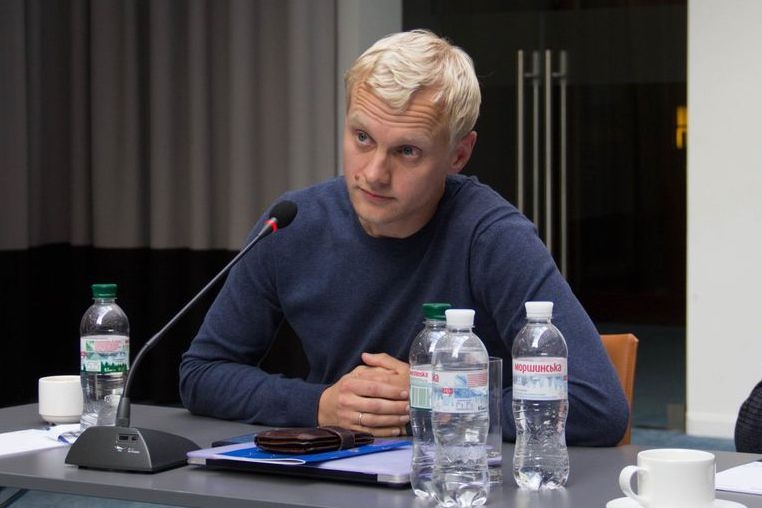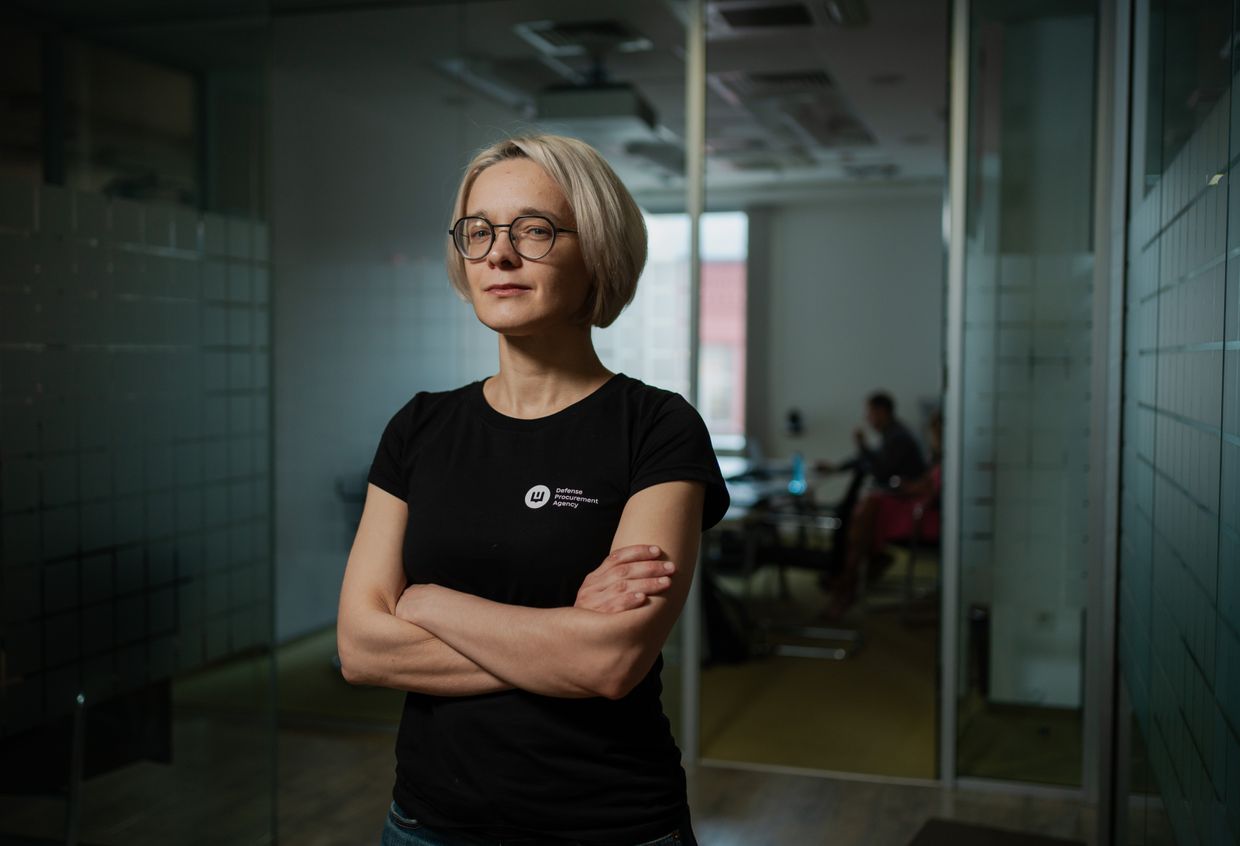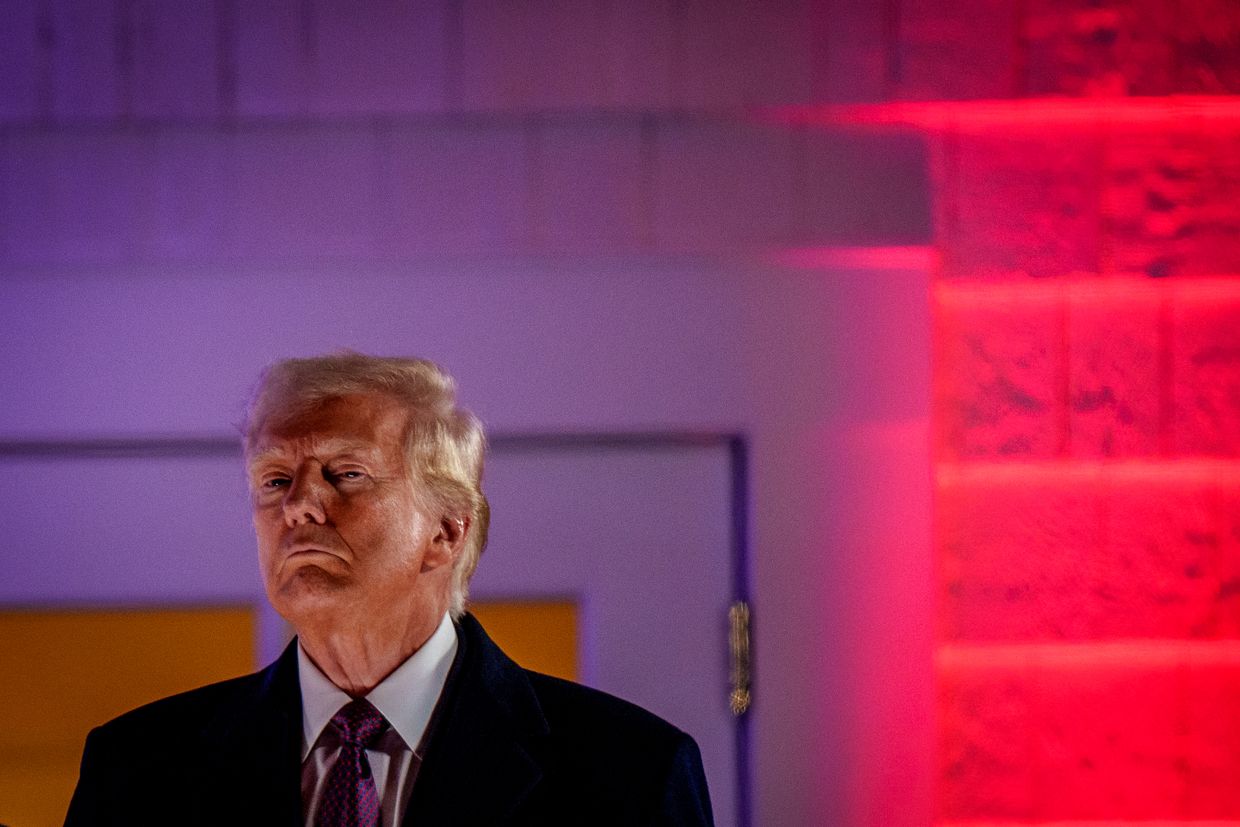Defense Minister Umerov dismisses top official who stood up to him

Ukraine's Defense Minister Rustem Umerov during a parliamentary session in Kyiv, Ukraine on Dec. 19, 2024. (Andrii Nesterenko / Global Images Ukraine via Getty Images)
Ukraine’s lengthy efforts to clean up its weapons procurement are in danger of being unwound as the Defense Ministry strangleholds the Defense Procurement Agency, say anti-corruption activists and lawmakers.
Defense Minister Rustem Umerov announced on Jan. 24 that he would not renew the contract of Maryna Bezrukova, the head of the Defense Procurement Agency (DPA), the body in charge of buying weapons for the Ukrainian military. He cited unsatisfactory results as the reason.
Umerov’s decision comes days after the DPA’s supervisory board voted to extend the contract with Bezrukova after a year of reforming in this role. According to Ukrainian law, supervisory boards have the authority to unilaterally hire and fire the heads of state enterprises. This means that legally, after the board’s vote, Bezrukova should take the reins of the Defense Procurement Agency (DPA) for another year.
But due to amendments recently made to the agency’s charter by the Defense Ministry, which oversees the DPA, this, or any other decision of the supervisory board could be reversed by the ministry.
Anti-corruption activists and lawmakers say that the amendments and Umerov’s decision are “unlawful.”
“It seems like a violation of legislation, violation of the reform process, and violation of the independence of the agency that was promised personally by the defense minister and his deputies to our society, to our partners,” Bezrukova told the Kyiv Independent after Umerov’s announcement.
“Umerov is trying to attack the reform,” she added.

Bezrukova told the Kyiv Independent that she would not leave the agency as she was legally selected by the DPA’s supervisory board.
“I'm not going to surrender. I will stand in my position until the end,” she said.
“I have a vision for the institutional development of the agency. I have over 25 years of experience in procurement,” she added.
Umerov also removed the board’s two state representatives, Taras Chmut and Yuriy Dzhygyr, claiming that they ignored the ministry’s recommendation to not extend the contract with Bezrukova. He added that the board will be “relaunched” in the future, upending nearly a year of work forming the board.
Umerov wants to replace Bezrukova with Arsen Zhumadilov, the director of the State Rear Operator (known under its Ukrainian acronym DOT) which buys food and clothes for the military. Previously, Umerov tried to merge the DPA with DOT into one unified body under Zhumadilov's leadership. Umerov and Zhumadilov are close, sources told the Kyiv Independent.
Umerov claimed the reason for the replacement was that DOT delivered better results.
Following Umerov’s announcement, Ukrainian anti-corruption activists have called for his dismissal, saying that he is disrupting the key reform for wartime Ukraine.
“These decisions of the minister are a clear sabotage and undermining of the country's defense capability,” Vitaliy Shabunin, the co-founder of the Anti-Corruption Action Center (ANTAC), wrote on Facebook.
Additionally, Umerov proposed to fire Deputy Defense Minister Dmytro Klimenkov, who he said “failed” the task of defense procurement.
The ministry set out to reform defense procurement after several high-profile corruption scandals emerged in 2023. Umerov brought Bezrukova on board in January 2024 to lead the transformation of the DPA.
Her main goal was to move to direct contracting with weapons producers that cut out middlemen who mark up prices or even fail to deliver on deals. One of the central pieces of the reform was the creation of an independent supervisory board that could protect the agency from political pressure and help ensure fair procurement.
However, Bezrukova has locked horns with the ministry multiple times while attempting to change the DPA’s practices. In July, the Kyiv Independent reported that she was facing pressure from arms dealers who were unhappy with her reforms.
Dud mines and dodgy deals
Bezrukova took over the DPA amid reforms in the defense procurement sector which was littered with scandals.
Under the agency’s previous head, Volodymyr Pikuzo, nearly all defense procurement contracts were through intermediaries, and dodgy contracts cost Ukraine tens of billions of hryvnia, according to Bezrukova, as well as delays of essential battlefield supplies.
Bezrukova sees the agency as “a platform” between the army and defense companies. In the last year, she has secured over 50 direct contracts from 13 countries for ammunition, missiles, radars, drones, and artillery systems under a total annual budget of Hr 306 billion ($7.3 billion).
Of the contracts last year, 61% were signed with Ukrainian companies, 27% with foreign companies, including major defense firms like Rheinmetall and KNDS, and 12% with Ukrainian intermediaries.

Both the DPA and the DOT, the agency in charge of food and clothes purchases, are performing “much better” than when the Defense Ministry was in charge of procurement, said Anastasia Radina, lawmaker and head of the parliament's anti-corruption committee.
Bezrukova took the role with the understanding that a supervisory board would be introduced, as is standard practice across state institutions. After facing pressure early on, she hoped the board would protect her, but it took nearly a year into her employment for it to be formed.
In the meantime, while the DPA was being overseen by the Defense Ministry, Bezrukova and the ministry repeatedly butted heads.
At the start of her job, Bezrukova said Deputy Defense Minister Klimenkov insisted she sign a contract for a large supply of shells despite her concerns about the manufacturer, owned by the Strategic Industries Ministry. (Editor’s Note: The manufacturer’s name is not mentioned for security reasons.)

The company’s capacities were too limited to produce the proposed 500,000 shells, due to a lack of workers and a gunpowder deficit, Bezrukova said. Additionally, at the time when the contract was being considered in February 2024, the company’s director and a manager were under two separate investigations for inflating prices, the National Anti-corruption Bureau (NABU) told the Kyiv Independent.
An initial ministry inspection of the manufacturer confirmed Bezrukova’s fears, noting that its production capacity was likely around 300-350,000 shells. But a few weeks later, the ministry inspector changed their mind, claiming that the company had enough capacity, according to Bezrukova. Despite concerns, Bezrukova signed the contract.
In the summer, the company was behind schedule. Bezrukova told Ukrainska Pravda, a Ukrainian media outlet, that Klimenkov asked her to extend the deadline for deliveries but she refused, insisting they should start looking for alternatives. It was at this point that her relationship with the ministry’s top brass went sour, she said.
The Kyiv Independent requested a comment from the Defense Ministry but hasn’t received a response.
By November, the shells were on the front line but many were failing to explode. Around 24,000 duds were withdrawn in December, leaving authorities clambering to find alternatives.
On Nov. 26, the Defense Ministry said it was investigating the incident and would deliver imported shells instead.
In another more recent clash, the ministry abruptly transferred Hr 23 billion ($546 million) from the DPA’s budget to the State Border Guard Service on Nov. 29, without forewarning Bezrukova.
The Defense Ministry and Armed Forces General Staff claimed that the DPA had over Hr 100 billion in unused funds that needed to be spent before the end of the year. However, the agency said that this blurred the truth. On Nov. 25, the alleged unused funds consisted of Hr 45 billion available for contracting and Hr 57 billion set aside for pre-agreed contracts.
But by Nov. 29, the agency had lined up more contracts for 2025 and the remaining funds dropped to Hr 21.8 billion. That same day, the government adopted the order to redistribute the Hr 23 billion and the DPA had to take Hr 1.2 billion from already concluded contracts to meet it.
A furious Bezrukova called for the money to be returned but it hasn’t been, according to the DPA.
The State Border Guard Service planned to spend the money on a contract with a reportedly dodgy Polish intermediary company PHU Lechmar for mines and shells for the army. The intermediary asked for a 100% prepayment, sounding alarm bells for Bezrukova who says she never pays more than 50% upfront.
“This is extremely risky,” said Bezrukova, adding that if Lechmar fails to deliver on the contract, there is no way to get the money back.
Undermining the board
Assembling the supervisory board — which is now to be “relaunched” — has been a long process, marked by tension between Umerov and Klimenkov on one side, and Bezrukova and anti-corruption activists, supported by Ukraine’s Western partners, on the other. The board was supposed to strengthen the agency and defend its head from illicit pressure.
While the ministry announced the shortlist of the DPA’s supervisory board candidates in June, it took almost six months for the board to come together. Bezrukova sees the delay as a deliberate attempt by the Defense Ministry to undermine the process, or an inability to do its job well.
Two board members, Taras Chmut and Kateryna Kuznetsova, told the Kyiv Independent that the process was fraught with bureaucratic hurdles, although they did not find it unusual. Chmut, who leads the Come Back Alive NGO that raises funds and buys weapons for the army, noted that Ukrainian bureaucracy is often a tedious process with endless paperwork.
But according to Radina, a lawmaker, the holdup was not justified.
While the process was dragging on, Umerov suddenly announced he wanted to merge the DPA with DOT in September 2024. The merger would see one agency dealing with both non-lethal and lethal aid under one supervisory board. Had it been successful, the supervisory board process would have been dragged out again, wasting time and money to rebuild the entire bureaucratic system like the financial budget and workflow.
Umerov was trying to “destroy” the DPA, said Shabunin, the co-founder of ANTAC. Instead of Bezrukova, Umerov wanted the director of DOT, Zhumadilov, to head the unified agency as the two men have a closer relationship, several sources told the Kyiv Independent.

DOT operates with a much smaller budget and staff and doesn’t deal with import contracts while the DPA does. Merging the two agencies for them to be led by DOT “does not make sense,” Shabunin said.
“It's a huge difference to buy food, which DOT does, and to buy weapons. The weapons market is much more complicated,” he added.
Umerov initially said the merger would bring Ukraine in line with NATO standards. However, the plan was swiftly rebuked by the Alliance who backed keeping the two agencies separate. Umerov U-turned on his proposal, saying the two agencies would remain independent during the war.
“It was not logical,” Bezrukova said. “In NATO recommendations, it clearly mentions that there are two agencies and that the Defense Ministry should develop and support the capacity of these two agencies, especially of the DPA.”
Just a day before the supervisory board was finally supposed to be officially formed on Dec. 17, the ministry made amendments to the DPA’s charter, undermining its authority.
According to Radina, the timing looks suspicious. The ministry also changed DOT’s charter but did so months prior.
“It definitely seems connected to the decision to finally form a supervisory board, to immediately render its powers questionable,” she said.
Shortly after the ministry’s decision, the board members published a statement that the changes “restrict the board's independence and create preconditions for interference in its activities.”
Future of the agency
Bezrukova was keen to stay on at the agency, planning to zero in on the quality and reliability of suppliers. She also hoped to bring the DPA closer in line with NATO agencies and have more autonomy from the Defense Ministry.
The supervisory board wanted Bezrukova to stay too. The board voted to extend Bezrukova’s contract for another year “based on the need to ensure stability and efficiency in procurement management in wartime.” Additionally, the board also suggested NATO’s auditing board (IBAN) carry out an independent audit.
“The state must move to transparent rules of the game: purchasing what the army really needs, when it is needed, and at fair prices,” Chmut wrote on Facebook after the announcement on Jan. 20.
According to the amended DPA charter, the ministry can “disagree” with the board’s decisions and push back.
In the long run, Radina is concerned about the broad wording of the amendments, which may allow the ministry to give obligatory orders to the DPA’s employees and even intervene in the procurement process, circumventing the agency’s leadership and procurement procedures.

Shabunin agrees with Radina, adding that this goes against NATO’s recommendations to divide the roles between the ministry and the supervisory board.
“(Umerov) changed the charter which provides him the possibility to do whatever he wants to do,” Shabunin told the Kyiv Independent.
According to Radina, “that’s a very dangerous precedent.”
“Any minister could decide to use this as an opportunity to influence decision-making on who will get a contract.”












